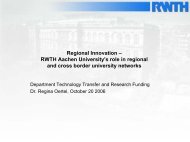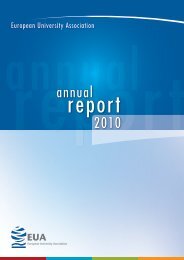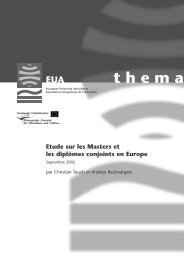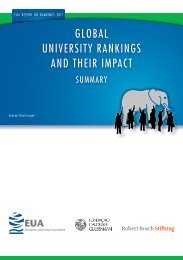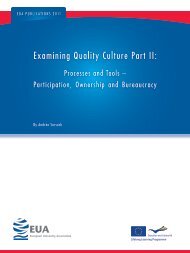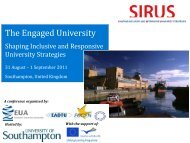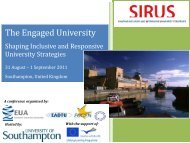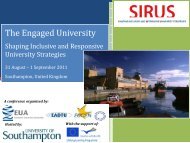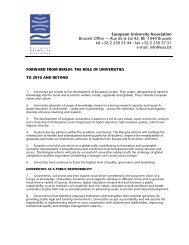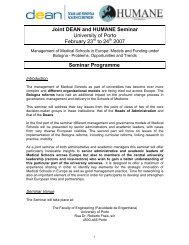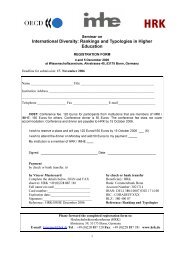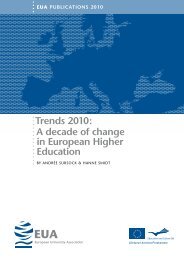Beiträge zur Hochschulforschung - European University Association
Beiträge zur Hochschulforschung - European University Association
Beiträge zur Hochschulforschung - European University Association
Create successful ePaper yourself
Turn your PDF publications into a flip-book with our unique Google optimized e-Paper software.
80<br />
Michael Jansen<br />
2012. This notably includes proportional accountability requirements in relation to the<br />
size of the government grants with three arrangements. For grants up to 25.000 Euro,<br />
the principle is that efforts for both the beneficiary and the funder are kept to a mini-<br />
mum in terms of financial administration; grants between 25.000 and 125.000 Euro<br />
do not require an audit; grants exceeding 125.000 Euro do require an auditor’s state-<br />
ment but financial modalities have also been simplified with a view to reduce admin-<br />
istrative costs.<br />
3.2 Agreement about funding rules<br />
Funding organisations and agencies play an important role not only because they<br />
provide external funding, but also due to the funding requirements and conditions that<br />
are linked to this funding and which have obvious steering effects on universities. They<br />
offer a broad spectrum of funding opportunities at national level, with the various<br />
agencies developing their specific profiles, e.g. focusing on basic or applied research,<br />
innovation or specific structures of research projects (cooperation with industry, cent-<br />
ers of competence, etc.). However, these opportunities are often linked to a substan-<br />
tial diversity in funding models and mechanisms.<br />
Universities are thus confronted with very heterogeneous sets of requirements depend-<br />
ing on the different types and roles of national and <strong>European</strong> funders. Some funders<br />
fund only part of the costs wherelse some others moved towards funding the full<br />
costs of an activity. It is clear that, in these conditions, it is a challenge for universities<br />
to develop their own coherent systems, as these heterogeneous requirements often<br />
force them to develop and maintain multiple systems based on different approaches<br />
and cultures.<br />
To overcome these challenges, and in addition to the uniform subsidy framework, all<br />
stakeholders such as universities, the government and intermediary funding bodies<br />
are working together to establish a transparent system, which should allow funders<br />
and beneficiaries to better identify who is paying which part of an educational or sci-<br />
entific activity. The new agreement was concluded in 2010 and the intention is that it<br />
should facilitate the transition towards funding on a full cost basis. This specifies which<br />
(direct) costs incurred in the framework of an externally funded research activity are<br />
reimbursed. Another important element of this agreement are transparent and clear<br />
definitions of funding. The parties involved are: the Netherlands Organization for Sci-<br />
entific Research (NWO); the <strong>Association</strong> of Universities in the Netherlands (VSNU);<br />
the Royal Netherlands Academy of Arts and Sciences (KNAW); the Netherlands Or-<br />
ganization for Health Research and Development (ZonMw) and the Dutch association<br />
of Charity funds VFI.<br />
<strong>Beiträge</strong> <strong>zur</strong> <strong>Hochschulforschung</strong>, 33. Jahrgang, 2/2011



